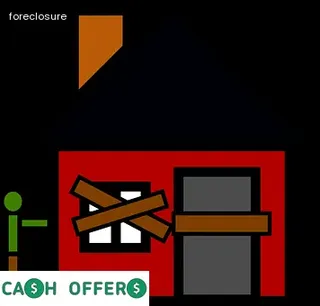The foreclosure process in Illinois is a complex one, with several different steps that must be completed before the property can be sold at auction. The first step of the process is the filing of a foreclosure complaint by the lender in court.
This officially starts the foreclosure action and notifies the homeowner that they are being sued for non-payment. After this, the homeowner has thirty days to file an answer to the complaint, otherwise a default judgment will be entered against them.
If an answer is filed, then both parties will enter into settlement negotiations to try and reach an agreement on how to resolve the debt. If no agreement can be reached, a hearing will take place in front of a judge where they determine whether or not foreclosure should proceed.
Once it is decided that foreclosure should move forward, public notices are posted informing potential buyers that a sale is pending. Finally, after all other conditions have been satisfied, an auction takes place where interested buyers bid on the property.
Following this, ownership is transferred and the entire process comes to an end.

Home foreclosure in Illinois can be a complicated and drawn-out process. It's important to understand the timeline of the foreclosure process and the different steps involved.
Common questions about home foreclosures in Illinois typically include: how long is the foreclosure process, what factors contribute to its duration, and what are the options for homeowners facing foreclosure? The answer to these questions depends on a variety of factors, including whether or not the homeowner is contesting the foreclosure, whether they are working with a lender towards an alternative solution such as refinancing or a loan modification, and even on local court backlogs. The typical timeframe for an uncontested foreclosure in Illinois is usually between four and six months, though depending on circumstances it can take up to a year.
In contested matters, timelines can be extended significantly, sometimes taking years to resolve. Homeowners facing foreclosure should speak with their lender as soon as possible to explore all available options that could help them avoid losing their homes.
Fortunately, there are ways to avoid foreclosure and protect your home in Illinois. Working out a payment plan with your mortgage lender is a great first step.
This can be done by talking to your loan servicer and coming up with an agreement that works best for you both. Additionally, refinancing or modifying your loan may be an option if you're unable to make your payments on time due to financial hardship or other reasons.
You can also look into government programs such as the Home Affordable Modification Program (HAMP) or the Hardest Hit Fund (HHF). Both of these options provide assistance to homeowners in distress so they can keep their homes and become current on their mortgage payments.
It's important to remember that time is of the essence when it comes to foreclosure, so seeking help quickly is essential in avoiding it altogether.

The foreclosure process in Illinois can be a long and complex one, but understanding it is important in order to protect your rights. Foreclosure is the process of repossessing a property due to nonpayment of mortgage obligations, and all states have different timelines for when this process can begin.
In Illinois, homeowners have the right to receive notice before foreclosure proceedings start, and must also be given an opportunity to cure the default within 30 days. If the homeowner does not cure the default within that time frame, then the lender has the right to initiate foreclosure proceedings.
The process usually takes about four months from start to finish, though it can take longer depending on how quickly court documents are filed. The court will ultimately decide if foreclosure is justified and decide whether or not the homeowner will be allowed to remain in their home.
Homeowners should seek legal advice from an attorney throughout this process in order to understand their rights and ensure a fair outcome.
When faced with the possibility of foreclosure in Illinois, homeowners may feel overwhelmed by the situation and unsure of what to do. It is important to assess all of your options so that you can make an informed decision when it comes to foreclosure proceedings.
Homeowners should start by speaking with a housing counselor or attorney who can provide guidance on their particular situation. Homeowners may be able to negotiate a loan modification with their lender, which could reduce payments and prevent foreclosure.
Additionally, homeowners should look into refinancing their mortgage or considering a deed-in-lieu of foreclosure as other options for avoiding foreclosure proceedings. If these options are not viable, then homeowners should work with their lender to determine the timeline for the process and look into filing for bankruptcy if appropriate.
It is essential that homeowners take proactive steps to understand their rights and options during this difficult time.

Failing to make mortgage payments carries a number of risks and potential consequences. In Illinois, the foreclosure process can be long and arduous, but not paying your mortgage can lead to a number of issues in the meantime.
One of the main risks is that you will damage your credit score by missing payments. This can make it difficult to qualify for future loans or secure financing for important purchases like cars or homes.
Additionally, you may be subject to legal action from lenders if you fail to pay your mortgage on time or in full. Finally, even if you are successful at staving off foreclosure, you may eventually have to vacate the property once it goes through the foreclosure process.
All these risks should be taken into consideration when deciding whether or not to make timely mortgage payments in Illinois.
Navigating financial difficulties during foreclosure can be a daunting process. In Illinois, the foreclosure timeline varies based on the type of loan and other factors, but in general there are certain steps that must be followed and timelines to consider.
The initial step is for the lender to file a complaint with the court and serve it to the borrower. A summons will then be issued by the court, giving notice of the foreclosure lawsuit and providing an opportunity to dispute it.
The borrower then has 30 days to respond or contest the complaint. If they do not respond within this period, a default judgment will be entered against them.
Once a default judgment is entered, the mortgagee may proceed to sell the property at a public auction after proper notice. After the sale has been completed, if there are still mortgage payments due from the borrower, they may still owe money even after losing their home in foreclosure.
Navigating these financial difficulties requires understanding of state laws and regulations as well as developing strategies for managing debt obligations in order to protect your assets and credit rating in difficult times.

Working with a qualified lawyer on foreclosure matters is an important step in understanding the Illinois foreclosure timeline. A lawyer can help homeowners better understand their rights and obligations under Illinois law, as well as provide legal counsel throughout the process.
During the foreclosure process, a qualified attorney can assist in negotiating a repayment plan or loan modification with the lender, ensuring that all paperwork is properly filed and all deadlines are met. They can also represent their clients at court hearings pertaining to the matter.
It's important for homeowners facing foreclosure to seek out a knowledgeable and experienced lawyer who specializes in foreclosures in order to receive comprehensive legal advice and advocacy during this difficult time.
When attempting to navigate the foreclosure process in Illinois, it is important to be aware of any potential legal challenges that may arise. The timeline for foreclosure in Illinois is largely determined by a number of factors, including the type of loan involved, the court proceedings and appeals, and potential legal issues.
If you are facing a possible foreclosure, it is essential to understand how long the process may take as well as what legal obstacles could potentially crop up along the way. Hiring an experienced real estate lawyer can provide invaluable guidance when dealing with foreclosure proceedings, as they can be knowledgeable of all relevant laws and regulations and assist in taking any necessary steps to protect your rights.
It is also advisable to look into state programs that may help alleviate some of your financial stressors, such as mortgage assistance or forbearance plans. Taking action early on and understanding the timeline associated with foreclosure in Illinois can go a long way in helping ensure that your rights remain protected throughout this difficult process.

When it comes to foreclosure, the best way to protect yourself and your home is to stay informed and be proactive. Understanding the timeline of a foreclosure in Illinois, from start to finish, is a key step in avoiding legal proceedings.
The most important strategy for keeping your home during a foreclosure is to take action quickly when you know you are behind on payments. Reach out to your lender as soon as possible and explore options for loan modifications or other financial alternatives that could help you catch up on payments.
Additionally, research and consider filing for bankruptcy, which can act as an automatic stay of foreclosure proceedings while offering you more time to restructure debt or find other solutions. All these strategies require careful consideration with the help of a professional financial advisor or attorney who can provide expert advice tailored to your specific situation.
Hiring an attorney can make a huge difference in the process of foreclosure in Illinois. An experienced attorney will know the timeline for foreclosure and how long each step takes, helping you to make educated decisions about your options.
They can help you understand the legal documents that are part of the foreclosure process, as well as provide advice on how to protect yourself and your rights when dealing with banks or other lenders. Additionally, they can negotiate on your behalf with lenders to come up with more favorable repayment plans or loan modifications.
They may even be able to represent you in court if it’s necessary. An attorney’s knowledge of applicable laws can be invaluable in protecting your interests throughout the foreclosure process and potentially avoiding costly mistakes that could cause irreparable damage to your financial health.

When facing foreclosure in Illinois, the process can seem overwhelming and confusing. With so much information to understand and paperwork to complete, it is understandable why many homeowners seek professional support.
Working with a housing counselor or legal professional can help provide guidance throughout the entire foreclosure timeline. Experienced professionals can offer advice on loan modifications and other programs that may be available to delay or prevent foreclosure, as well as provide education on the steps involved in the foreclosure process.
They can also explain any rights that homeowners have under state law and help them make informed decisions regarding their mortgage situation. Professional support can provide peace of mind, allowing homeowners to focus on finding ways to save their home rather than worrying about navigating through a lengthy process alone.
If you find yourself struggling to make mortgage payments in Illinois, it is important to take action as soon as possible. There are several solutions available to homeowners in Illinois who are facing financial difficulty and want to avoid foreclosure.
Start by speaking with your lender about modifying your loan terms or refinancing your home. If that isn't an option, consider seeking out government assistance programs such as Homeowner's HOPE Hotline.
Additionally, you may be able to work with a housing counseling agency, which can provide advice on budgeting and other resources. Finally, if you receive notice of a pending foreclosure, make sure to understand the Illinois foreclosure timeline so you know how long the process will take and what steps you need to take in order to protect your rights.

Working with an experienced attorney on mortgage issues can be beneficial for those in the foreclosure process. An attorney understands the legal proceedings and is knowledgeable about the laws that apply to foreclosures in Illinois.
They can provide guidance and advice to help homeowners navigate through the stressful process. An attorney can help you understand your rights, evaluate your options, review any documents related to your case, and explain what steps need to be taken.
Having an attorney who specializes in mortgages on your side can save you time and money throughout the foreclosure timeline as they are able to work diligently and quickly to keep your case progressing. Additionally, they may be able to negotiate terms with lenders or even act as an intermediary between you and other parties involved in the foreclosure process.
With their assistance, you may be able to avoid costly mistakes or prolong a lengthy foreclosure timeline.
Illinois foreclosure timeline and potential pitfalls of home loan modification should be carefully reviewed before entering into an agreement. It is important to understand the process and what you are agreeing to as a homeowner if you choose to modify your loan.
In Illinois, the foreclosure timeline can be lengthy due to certain laws that are in place for protection. A homeowner may be able to avoid a foreclosure by obtaining a loan modification, which allows them to better manage their debt and keep their home.
However, it is important for homeowners to understand the terms of their loan modification agreement and the consequences of defaulting on payments before making a decision. Additionally, there are further requirements from the lender that must be met in order for the loan modification to be approved.
Homeowners should also research potential scams or predatory lending practices they could encounter when seeking out help with their home loans. Knowing these potential pitfalls can help homeowners make an informed decision when considering a loan modification agreement in Illinois.

The length of an Illinois foreclosure timeline can vary based on a few factors, such as the type of loan, the amount of debt owed and whether there is a deficiency. A mortgage that is insured by the Federal Housing Administration (FHA) or Department of Veterans Affairs (VA) typically takes longer than one without government backing.
Additionally, if the borrower owes more money than what the home is worth, they may be able to make up the difference through a deficiency judgment. Depending on the state laws, some lenders will also be able to pursue this form of debt collection after foreclosure has been completed.
In most cases, foreclosures take four to six months to complete but this can be extended due to certain court proceedings. Borrowers who are struggling with their payments should contact their lender as soon as possible in order to discuss potential options for avoiding foreclosure altogether.
As a homeowner in the state of Illinois, it is important to know your rights during a foreclosure. The process can be daunting and lengthy, but understanding the timeline of foreclosure in Illinois can help you prepare for the situation.
Foreclosure begins when a homeowner fails to make their mortgage payments as required by their mortgage agreement. The lender then files a complaint with the court in order to start the foreclosure process.
After receiving notification from the lender, homeowners have thirty days to respond, otherwise they will forfeit their right to defend themselves in court. The next step is an Order of Possession which requires all occupants of the property to move out within twelve days or face eviction proceedings.
During this time, homeowners still have the opportunity to work out a payment plan or loan modification with their lender. If no agreement is reached, the foreclosure will proceed and culminate with a sale of the property at a public auction where bidders are typically lenders looking to recoup part or all of what was owed on the home loan.

The benefits of mitigation and negotiation during the foreclosure process are often overlooked, but they can be extremely helpful in helping to speed up the timeline of an Illinois foreclosure. When homeowners negotiate with their lender, they may be able to reach an agreement on a payment plan that works for both parties.
This allows them to stay in their home longer and avoid the costly fees associated with foreclosure. Additionally, if necessary, lenders may be willing to enter into a loan modification or forbearance agreement which can help reduce the amount owed.
Mitigation can also provide homeowners with additional time to find alternative solutions that may include refinancing or selling their home. Ultimately, mitigation and negotiation can make a huge difference when it comes to navigating an Illinois foreclosure timeline.
If you are facing foreclosure in Illinois, the good news is that there are steps you can take to stop the process. Your first step should be contacting your lender or mortgage servicer as soon as possible to explore options for loan modification or refinancing.
Alternatively, you may be able to explore a repayment plan or forbearance agreement. The Illinois Housing Development Authority (IHDA) also offers assistance programs for homeowners who are having difficulty making their mortgage payments.
Additionally, there are several free legal services available for those facing foreclosure in Illinois, including the Chicago Bar Association's Foreclosure Legal Assistance Hotline and the Illinois Attorney General's Homeowner's Foreclosure Resource Network. Taking action quickly is key to preventing your home from going into foreclosure.
Understanding and exploring the various options available can help you find a solution that works best for your financial situation and helps keep your home out of foreclosure.

When a house in Illinois goes into foreclosure, homeowners are faced with a difficult situation. Homeowners must understand the timeline of the foreclosure process and be aware of their rights and responsibilities throughout the duration of the process.
In Illinois, it generally takes about four to six months for a home to go through the entire foreclosure process from start to finish. The first step is when the lender issues a notice of default and sets a ‘redemption period’—usually 30 days—during which time the homeowner can make up missed payments and reinstate their loan.
If they are unable to do so, they will lose their right to redeem and their home will be auctioned off by the lender or mortgage holder. After this, there is usually another 60-day period during which time the former homeowner has an opportunity to move out of their property.
During this time, they may also be responsible for paying any associated fees such as maintenance costs. Finally, after that 60-day period ends, the property is sold to its highest bidder at an auction in front of a sheriff or court appointed representative.
With knowledge of these steps in mind, homeowners can prepare themselves for what may come if they are faced with a foreclosure in Illinois.
In Illinois, homeowners facing foreclosure can remain in their home for a certain period of time even after the foreclosure process has begun. The length of time a homeowner may live in a foreclosed home is determined by the Illinois foreclosure timeline.
Generally, it takes between four to six months from start to finish for the foreclosure process to be completed. During this timeframe, homeowners may remain in their property until the foreclosure auction is conducted and the sale is finalized.
However, lenders may also choose to pursue an expedited timeline which could result in a shorter period of residency before the property is sold. After the sale has been finalized, all occupants are required to vacate the premises within 30 days or face eviction proceedings.
The 120 day foreclosure rule is an important consideration for homeowners in Illinois. This law states that lenders must wait at least 120 days before they can begin the foreclosure process.
This timeline provides homeowners with a measure of protection from the lender and allows them to explore other options such as loan modification or refinancing. During this time, the lender must make all reasonable efforts to contact the homeowner and discuss possible alternatives to foreclosure.
If the homeowner does not respond or cannot come to an agreement, then the lender may move forward with initiating a foreclosure action after the 120 day period has passed. The whole process of foreclosure can take several months, depending on court proceedings and other factors, so it is important for homeowners to be aware of this rule and act promptly if they find themselves facing foreclosure.
A: The length of a foreclosure process in Illinois is highly variable and depends on several factors, including whether the homeowner is pursuing foreclosure defense or if the property is being sold at a foreclosure sale. Generally, the timeframe from start to finish can range from as little as four months to as long as 18 months.